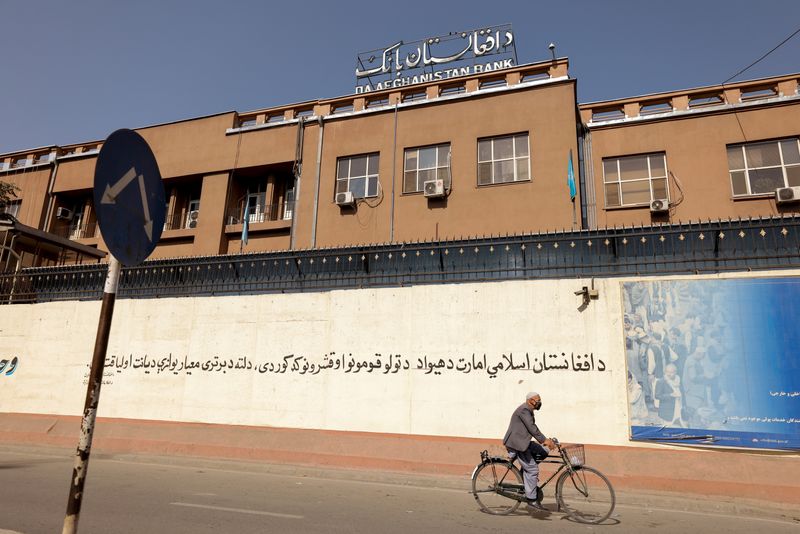By Jonathan Stempel
NEW YORK (Reuters) -A U.S. judge decided on Tuesday that victims of the Sept. 11, 2001, attacks are not entitled to seize $3.5 billion of assets belonging to Afghanistan's central bank to satisfy court judgments they obtained against the Taliban.
U.S. District Judge George Daniels in Manhattan said he was "constitutionally restrained" from finding that the Taliban was Afghanistan's legitimate government, a precursor for attaching assets belonging to Da Afghanistan Bank, or DAB.
Daniels said letting victims seize those assets would amount to a ruling that the Taliban are Afghanistan's legitimate government.
He said U.S. courts lack power to reach that conclusion, noting that Biden administration does not recognize the Taliban as Afghanistan's government.
"The judgment creditors are entitled to collect on their default judgments and be made whole for the worst terrorist attack in our nation's history, but they cannot do so with the funds of the central bank of Afghanistan," Daniels wrote.
"The Taliban - not the former Islamic Republic of Afghanistan or the Afghan people - must pay for the Taliban's liability in the 9/11 attacks," he added.
Daniels' decision is a defeat for four groups of judgment creditors that claimed some of the $7 billion of DAB funds that had been frozen at the Federal Reserve Bank in New York.
"This decision deprives over 10,000 members of the 9/11 community of their right to collect compensation from the Taliban," said Lee Wolosky, a lawyer for one creditor group known as the Havlish plaintiffs. "We believe it is wrongly decided and will appeal."
The other creditor groups are also planning an appeal, a separate Tuesday court filing shows.
In an executive order last February, U.S. President Joe Biden ordered $3.5 billion of the DAB funds set aside to benefit the Afghan people.
Last September, the U.S. Treasury said it would move that money to a Swiss-based trust beyond the Taliban's reach.
NOT THE TALIBAN'S MONEY
The creditor groups had sued many defendants, including al-Qaeda, over the Sept. 11 attacks, and obtained default judgments after the defendants failed to show up in court.
At the time of the attacks, the Taliban had allowed al-Qaeda to operate within Afghanistan.
The United States ousted the Taliban and al-Qaeda in late 2001, but the Taliban returned to power in 2021 when Western forces pulled out of the country.
In his 30-page decision, Daniels adopted findings of U.S. Magistrate Judge Sarah Netburn, who last August also recommended no recovery for the creditor groups.
Daniels said he lacked jurisdiction over DAB under federal law because the bank was an instrumentality of a foreign government and thus had immunity.
He also said Afghanistan, as opposed to the Taliban, neither qualified as a "terrorist party" nor had been designated a state sponsor of terrorism.
"Neither the Taliban nor the judgment creditors are entitled to raid the coffers of the state of Afghanistan to pay the Taliban's debts," Daniels wrote.
Other countries recently held about $2 billion of Afghan reserves.
Nearly 3,000 people died on Sept. 11, 2001, when planes were flown into New York's World Trade Center, the Pentagon in northern Virginia, and a Pennsylvania field.

U.S. sanctions ban doing financial business with the Taliban but allow humanitarian support for the Afghan people.
The case is In re Terrorist Attacks on Sept. 11, 2001, U.S. District Court, Southern District of New York, No. 03-md-01570.